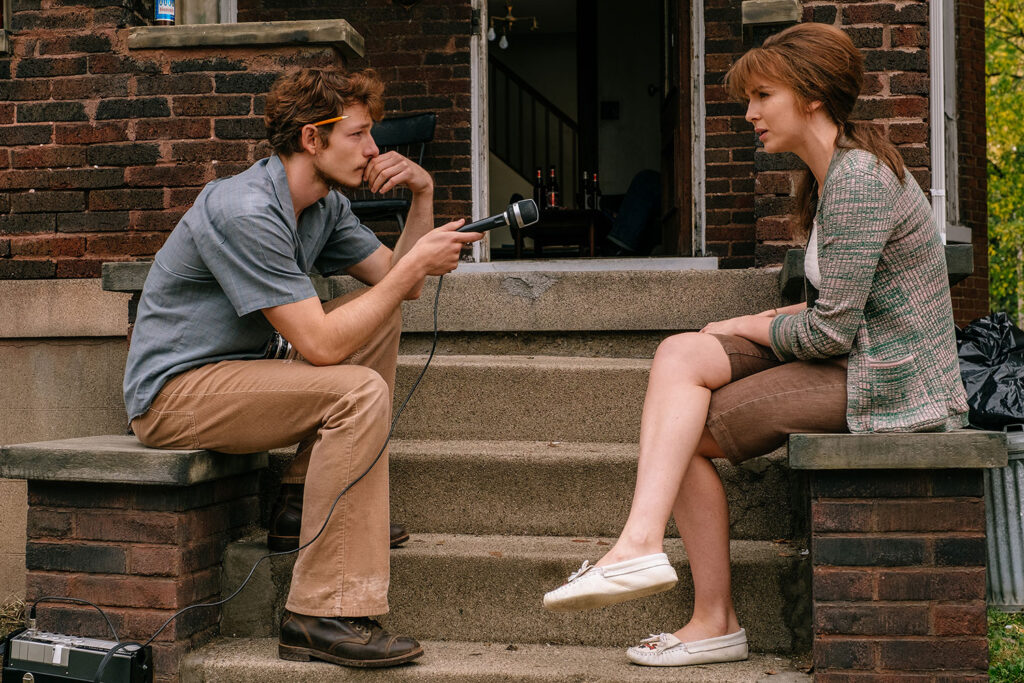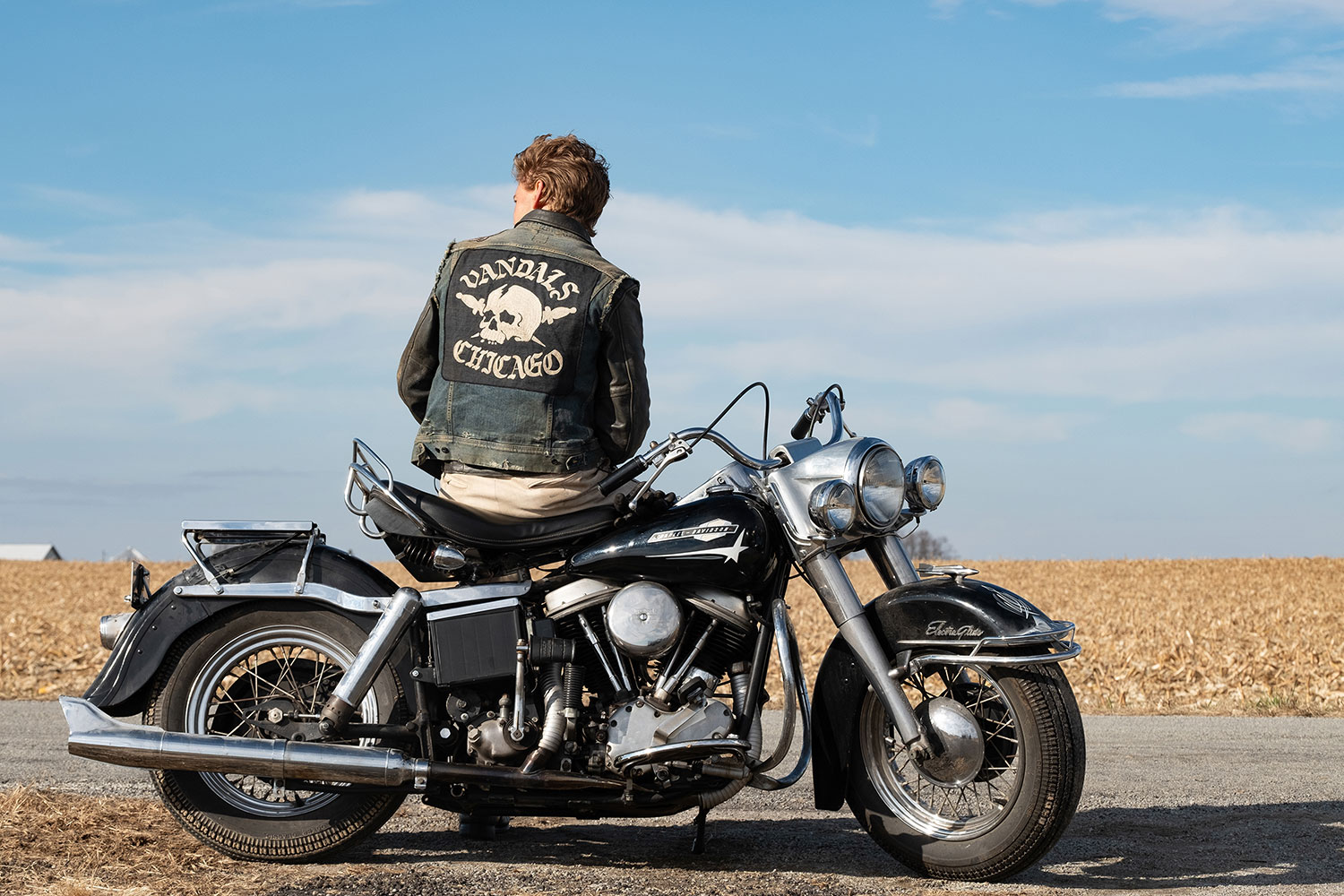The greaser ’60s just never get as much attention as the hippie ’60s. We’ve all read about the rebellions on college campuses: the long hair, the anti-war protests, the drugs, the acid rock. But during that decade, there was another rebellion taking place in blue-collar communities, among young men who never went to college. They drove trucks, or worked in factories, and in their spare time, they formed motorcycle gangs, drinking beer, shooting pool, smoking cigarettes and riding Harley-Davidsons.
This is the world of The Bikeriders, the new movie based on Danny Lyon’s 1968 book of the same name, a landmark work of photojournalism in which he photographed and interviewed members of the Chicago Outlaws, a mellower Midwestern version of the Hells Angels. Turning Lyon’s beautiful black-and-white portraits into drama, though, is a trick director Jeff Nichols can’t quite pull off.
In an interview shown before the film, Nichols cited The Wild Ones, Easy Riders, and The Outsiders (the quintessential ’60s greaser movie) as inspirations for The Bikeriders. As I’m sure even he’d admit, his movie doesn’t live up to any of those. The central character isn’t a biker at all, it’s a biker moll, Kathy, played by English actress Jodie Comer with a passable Chicago accent gleaned from Lyon’s tape recordings. Kathy narrates the proceedings, in the form of an interview with a photographer based on Lyon. A good girl from the South Side, Kathy gets dragged to a Chicago Vandals party in a seedy bar. Her initial reaction: “I never wanna see these guys again; they’re real idiots.” Except for Benny, brooding, handsome Benny, played by Austin Butler, best known for his star turn as Elvis. Benny offers her a ride on the back of his bike, then waits outside her house all night, smoking cigarette after cigarette until she succumbs to his charm: “Five weeks later, I married him.”
The Bikeriders does have a certain photojournalistic quality, engaging all five senses as it pops off the screen. You can practically smell the cigarettes, the suds, the leather, the gasoline, the hair grease, the sweat. Disappointingly, though, it was filmed in Cincinnati, which looks like a mid-sized Midwestern river town, not a metropolis by a lake. Neon signs in bar windows advertise Yuengling, which has never been sold in Illinois. Characters talk about a rumble at “Fuller by the lake.” Maybe the filmmakers got a tax break from the state of Ohio, but in my honest opinion, movies about Chicago should be filmed in Chicago.
The movie also captures the class antagonism between the bikers and the society they feel has rejected them. In the ’60s, Chicago was as much a blue-collar industrial town as Milwaukee, Detroit, Cleveland, Buffalo, or any other Great Lakes city. In one scene, Zipco, played by sometime Chicagoan Michael Shannon, moans about “pinko motherfuckers. Pinkos. College boys. They wear tennis shoes and short pants. I don’t want no pinkos in my family. If you can’t work with your fuckin’ hands, you ain’t no good.” Later, Zipco reveals he volunteered for Vietnam, but was turned down as “an undesirable character”: “I wanted to go. There’s pinkos burnin’ their draft cards, and I wanted to go.”

Among the beautifully shot scenes of taverns, rumbles, races, and runs, the only drama in this movie is Kathy’s attempt to lure Benny away from the biker lifestyle, especially after he almost loses his leg in a bar fight. The club’s leader, Johnny (Tom Hardy), who founded the Vandals after watching The Wild Ones on TV, wants Benny to take over for him. He’s got a family. He’s getting older. He can’t fight off challengers forever. Kathy confronts Johnny in a bar, telling him, “He’s mine. I’m his wife. You can’t have him.” But when she tells Benny, “I want you to quit the club,” he stares at her and says, “Don’t ask that.”
“I thought I could change him,” Kathy says. “He’s wild. I thought he’d get over that. Every woman thinks she can change a guy.”
Eventually, the Vandals change. The “new guys,” who include returning Vietnam vets, take over. They’re pot smokers, not beer drinkers. They’re into criminality, not camaraderie. One reason Easy Rider is such a totemic ’60s movie is that it combined both of these rebellions in its main characters: Wyatt and Captain America are hippies on Harleys. But The Bikeriders is only interested in those good old greaser days. Once those ended, riding a motorcycle just wasn’t the same.
It’s a cliche, but in this case, the book is better than the movie. The best result of The Bikeriders should be a renewed interest in Lyon’s work, as well as in Hunter S. Thompson’s Hells Angels, which features a character who makes an appearance in this movie: Funny Sonny, a member of the “Dead Devils” who rides all the way from California in search of a biker who dropped out of the club to join the Vandals. The greaser ’60s had its own literature long before it had this movie.



